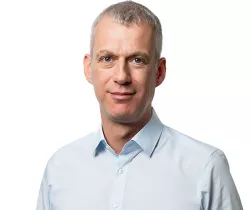We are in unchartered territory with a global pandemic disrupting lives and livelihoods. But, with successful trials paving the way for mass vaccinations, with better knowledge around COVID-19 and faster and more efficient testing schemes available, we are finding ways to live with and ultimately manage this virus. The tide is turning.
As we head towards 2021, the UFI team has – as we have every year – put together five trends that we believe will drive our industry’s development over the next 12–18 months. As always, these are based on conversations with and insights from our global UFI community as well as other stakeholders.
The threat will fade
First and foremost: This, too, will pass. The pandemic will end over time, even if the virus stays. Business will return, and life will return to more normality. The marketplaces and meeting places that we build and operate as an industry will be key for economic recovery, and a growing number of governments are understanding that. Think Australia with government funding. Think Germany, separating trade shows from mass gatherings and declaring that attending a show is essential travel. Think Singapore, actively exploring the opportunities to benefit from the resurgence of the business events sector. If we, as the exhibition industry and as the bigger business events community stay united, continuing to speak to authorities and governments with one voice, other governments will follow.
We will bounce back
We will see our sector grow again in 2021. And in 2022, 2023 and beyond. Part of that is simply math as we have lost an estimated 70 percent of revenues globally in 2020 year-on-year. Some markets will bounce back fast, others will need more time. But we know, both from our global research and from the ground in markets like China, that companies are eager to return to the trade show floor.
Global media takes note, as for instance, the New York Times writes that: “For small and midsize companies, (trade shows) are a window on the world.” Travel restrictions and complexities will mean that initially, national and regional shows will drive this recovery. Products and brands will more easily travel long haul than visitors. Global shows will “glocalize.” And, of course, we will safely run shows with COVID protocols in place.
Back to basics – focusing on the "trade" in trade show
The next 12–18 months will be about the “trade” in “trade show.” It will be about buyers meeting sellers to do business. It will be about getting back to face-to-face and onsite after screen to screen/online. People and businesses will need to re-connect to re-charge their business relationships that are being kept alive through lockdowns and restrictions thanks to digital and online events. Trade show budgets will return – business events are and remain by far the most relevant marketing channel for small and medium enterprises, and they make up the vast majority of our industry’s customers.
Digital is everyone’s challenge
The most discussed topic in 2021 might well be the future role of digital exhibitions and trade shows. The generic “hybridization” discussion we have had in 2020 will evolve and become more specific. The pressure is on – everywhere. Organizers need to apply the high-speed learning curve that the industry is forced through during the pandemic. Our colleagues on the event tech and digital side will need to deepen their understanding of the face-to-face ecosystem that we all operate in. Let’s please, finally, put the “virtual trade show” behind us! At its worst, a “hybrid” exhibition multiplies complexities and minimizes the financial result. At its best, it can expand reach significantly by creating year-round marketplaces. However, we have a long way to go before we can realize that potential.
The people make it happen
Right now, we are all suffering, and far too many talented event professionals have found themselves furloughed or out of a job. Big corporates are looking at event professionals and will begin to hire them as their own corporate meeting cultures evolve. Keeping people connected in these changing times will be a challenge, so industry community groups such as the Exhibition Think Tank Club will be powerful and important platforms for our industry. At the same time, COVID-19 has highlighted the importance of physical meetings. As a result, events will become an even more attractive industry to join. We have always attracted talent from very diverse backgrounds – be it by profession, race, nationality, gender or skillset. This diversity has always made our industry stronger and that will continue to be the case in the post-COVID world.
Don’t miss any event-related news: Sign up for our weekly e-newsletter HERE and engage with us on Twitter, Facebook, LinkedIn and Instagram!



Add new comment